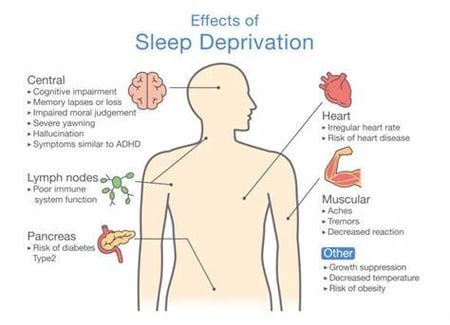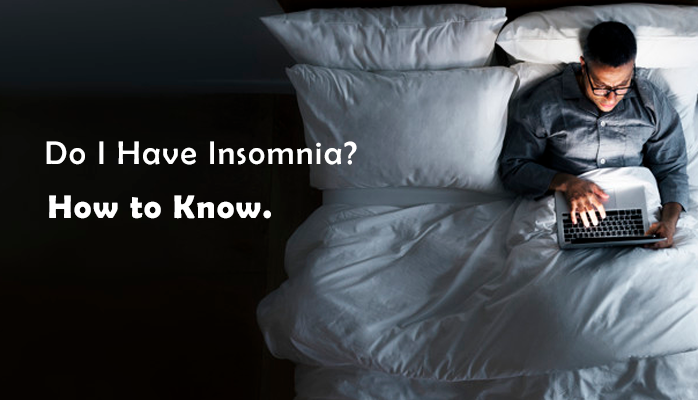Overview of Insomnia
Insomnia is a sleeping disorder that can cause sleep deprivation and subsequent frustration. Insomnia arises when you either can’t fall asleep, can’t stay asleep, or always wake up far earlier than necessary. The result of insomnia is mild to severe sleep deprivation, which can have catastrophic emotional, cognitive, physical, or social effects. In short, every area of your health can be greatly reduced from sleep deprivation related to insomnia.
Types of Insomnia
Insomnia is not quite as straightforward as it's presented in modern society. This is because there are two types of insomnia and two modes of insomnia.
The two types of insomnia are:
- Primary insomnia – insomnia without clear cause
- Secondary insomnia – insomnia with a clear cause
The two modes of insomnia are:
- Acute insomnia – short term, a month or less
- Chronic insomnia – symptomatic, long term (at least three times per week for a month or more)
To summarize, the four types of insomnia that can result are:
- Secondary/acute insomnia – temporary insomnia in response to a temporary illness, stress, etc.
- Primary/acute insomnia – temporary insomnia without a discernible reason
- Secondary/chronic insomnia – chronic insomnia in response to (usually) chronic life problem such as pain, long-term illness, etc.
- Primary/chronic insomnia – chronic insomnia without a discernible cause
If you are trying to identify insomnia in yourself, it would be helpful to identify whether or not your sleep problems are recent or chronic, and whether or not you know a clear reason that is preventing your sleep. Considering these things will be helpful for getting a formal diagnosis.
Causes of Primary Insomnia
Acute, short-term insomnia is usually caused in response to temporary, external factors such as:
- Short term illness
- Jet lag
- Switching shifts at work
- Temporary regimens of medication
- Travel
- Significant stress (divorce, job loss, death of loved one, moving)
Generally, acute insomnia may clear up once the cause goes away. Even if there is no discernible cause for your short term insomnia, it may clear up on its own. Of course, it may also develop into long-term, chronic insomnia.
Causes of insomnia for chronic long-term insomnia include things like:
- Age-related sleep changes
- Chronic stress
- Chronic anxiety
- Depression
- Chronic pain
- Circadian rhythm disorders
- Dependence on certain medications
- Habitual life style choices
- Chronic substance abuse
- Especially in Alaska, seasonal effects or transitions (light/dark extremes)
- Other sleep disorders
Risk Factors for Developing Insomnia
Another helpful tool for evaluating the presence or absence of insomnia is understanding the risk factors for developing it.
Most common, with age (65+) people are significantly more likely to report and develop insomnia because of natural biological changes that take place. It’s also more common in women than men.
Beyond this, here are various things that can make you at risk for insomnia. Look through the lists below and see a list of common risk factors.
Diseases That are Risk Factors for Developing Insomnia
 Many diseases can affect our ability to sleep, and make us at risk for developing insomnia:
Many diseases can affect our ability to sleep, and make us at risk for developing insomnia:
- Diabetes
- Kidney disease
- Lung disease
- Arthritis
- Heart disease
- Heavy smoking
- Sleep apnea
- Restless leg syndrome (RLS)
- Addiction
- Parkinson’s disease
- Alzheimer’s disease
- Mental disease
Medical Risk Factors for Developing Insomnia
Certain medications cause insomnia (primary) as a side effect, and include:
- Diet pills
- Steroids
- High blood pressure medications
- Theophylline
- Phenytoin
- Levodopa
- Decongestants
Psychological Risk Factors for Developing Insomnia
Psychological factors are some of the most common factors for developing primary insomnia and include:
- Depression
- Anxiety
- Stress from marriage/job/health issues
Lifestyle Risk Factors for Developing Insomnia
Lastly, insomnia is also commonly caused by lifestyle choices that make sleep difficult, such as:
- Shift work
- Poor pre-sleep habits (screens, diet)
- Drinking before bed
- Drinking too much coffee
- Jet lag
- Poor sleep environment – noisy, bright, distractions, etc.
- Exercising close to bedtime
Treatment for Insomnia
Insomnia should be treated differently depending on what type of insomnia you have. Acute insomnia will likely go away on its own – once the cause is removed you will likely be sleeping well again.
Chronic insomnia treatments may be a little less straightforward and will likely require some intervention, usually behavioral therapy. This might include:
- Therapy
- Education on good sleep habits
- Lifestyle changes
- Ways to reduce severity of chronic causes (such as pain treatment)
- Avoiding screens before bedtime
Over the counter pills are usually not recommended – such as melatonin – because they may have undesired side effects and lose their effectiveness over time.
Treating insomnia will likely require direct consultation with your doctor or a sleep specialist, and may require trial and error to narrow down possible causes and best treatment options.
If you live in Alaska and are worried that you are struggling with insomnia, please contact one of our sleep specialists by clicking the orange button below to take a free online sleep test.


